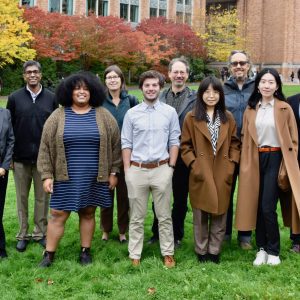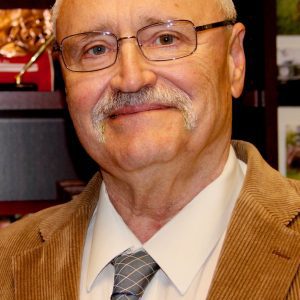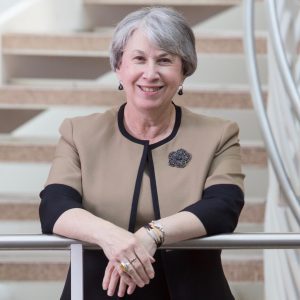College of Humanities & Earth and Social Sciences

Community Mourns Death Of Colleague Susan Gardner
Associate Professor Emeritus Susan Gardner died on January 2, 2022 after an extensive illness. Gardner joined UNC Charlotte’s English Department in 1990 and had taught in the United States, South Africa, Denmark, and New Guinea. Colleagues described Gardner as a strong advocate for diversity and global engagement who was vibrant, thoughful, kind, and generous to students and colleagues. A memorial service is planned for later in the spring.

UNC Charlotte Honors Student Earns Highly Competitive Graduate Fellowship, Opening Doors To Future Public Service Career
Betsabe Rojas Gonzalez is one of the first UNC Charlotte students or alumni ever chosen for the highly competitive Thomas R. Pickering Foreign Affairs Program graduate fellowship. Fellows receive up to $84,000 for two years of graduate studies, internships, and other professional development opportunities and have the opportunity to work as a U.S. Foreign Service officer.

In History-Setting Decision, UNC Charlotte English Alumna Confirmed As United States Attorney In North Carolina’s Middle District
The U.S. Senate has confirmed UNC Charlotte alumna Sandra J. Hairston as United States Attorney for the Middle District of North Carolina, making history with her selection as the first Black woman to serve as the district’s top prosecutor. Hairston earned a bachelor’s degree in English from UNC Charlotte in 1981.

UNC Charlotte Research, Outreach Efforts On Well Water Safety In Gaston County Set To Expand
A significant proportion of Gaston County residents get their drinking water from private wells and other unregulated sources, particularly in the county’s northern and western rural communities. Yet, only a small fraction of residents test their water regularly. A UNC Charlotte team will work with residents and county health officials to boost the number of people doing tests regularly and improve the sharing of data, with new state funding to broaden the work.

Team Including UNC Charlotte Researcher Receives $2M From National Science Foundation To Design Adaptable Urban Spaces
A team including UNC Charlotte urban planning researcher Katherine Idziorek has received a nearly $2 million grant from the National Science Foundation to advance research on how urban social and spatial systems can be organized to be more resilient and efficient.

Health Psychology Doctoral Student Wins NIH Funding To Expand Research In Maternal Health
UNC Charlotte health psychology doctoral student Jan Mooney is expanding her research in maternal health, with support from a National Institutes of Health (NIH) Intramural Research Training Award. The fellowship from the Eunice Kennedy Shriver National Institute of Child Health and Human Development will allow Mooney to work closely with NIH scientists.

College Mourns Passing of Longtime Psychological Science Colleague
Associate Professor Emeritus Charles Denton (Denny) Fernald died October 5, 2021 at the age of 77 following a year of care provided by Hospice of the Blue Ridge. Fernald was a faculty member for 42 years in what is now the Department of Psychological Science. Memorial donations may be made to: UNC Charlotte, Dr. Denny and Jo Ann Fernald Disability
Scholarship Fund, Attn.: Judy Lekowski, Office of University Advancement, 9201 University City Blvd., Charlotte, NC 28223.

Communication Studies Professor Earns Public Relations Society of America’s Highest Honor For Lifetime Achievement
UNC Charlotte Communication Studies Professor Dean A. Kruckeberg has earned the Public Relations Society of America (PRSA) Gold Anvil Award, the society’s highest honor for lifetime achievement in public relations. “This is certainly the greatest professional honor I have ever received during my career,” Kruckeberg said. “It’s particularly meaningful because it is awarded by a professional association that is comprised primarily of practitioners as well as of educators.”

Dean Gutierrez To Retire In June, Leaving Legacy Of Commitment to Knowledge
When Nancy Gutierrez retires as dean of the College of Liberal Arts & Sciences (CLAS) at the end of the 2021-22 academic year, she leaves a legacy defined by a commitment to helping students develop a curiosity about the world and the knowledge and skills to pursue lives of purpose, and a dedication to facilitating faculty research and scholarship for what it discovers about the world around us.

Personally Speaking Talk Focuses On Alt-Right Gangs
Research by UNC Charlotte faculty expert Shannon Reid and co-author Matthew Valasik focuses on understanding the evidence behind the development, growth, and influence of alt-right groups within the white power movement. To learn more about this timely topic, join Reid for the kickoff of the 2021-22 Personally Speaking published authors’ series.